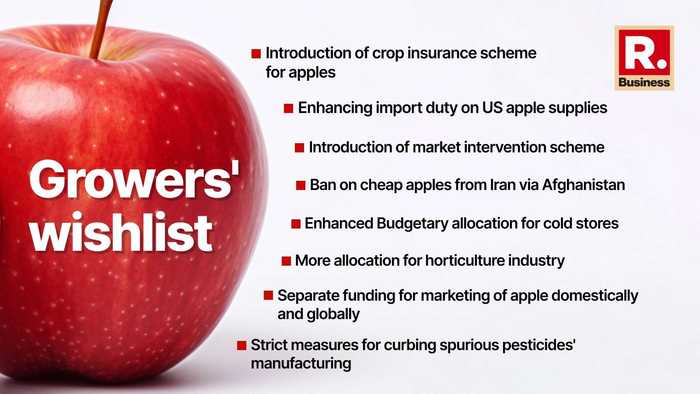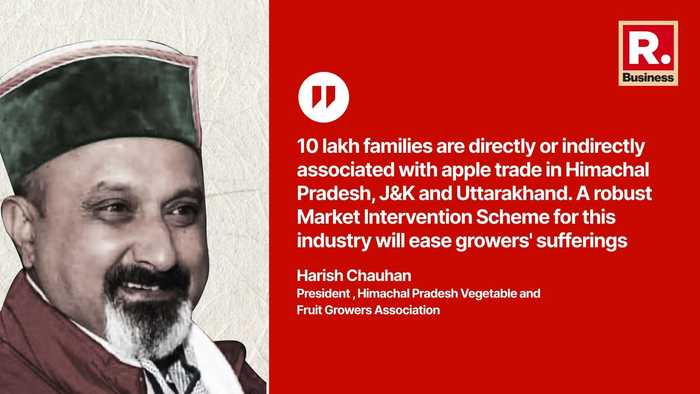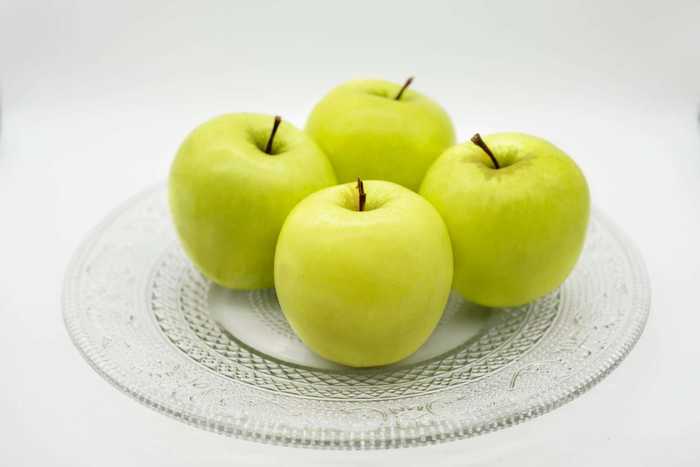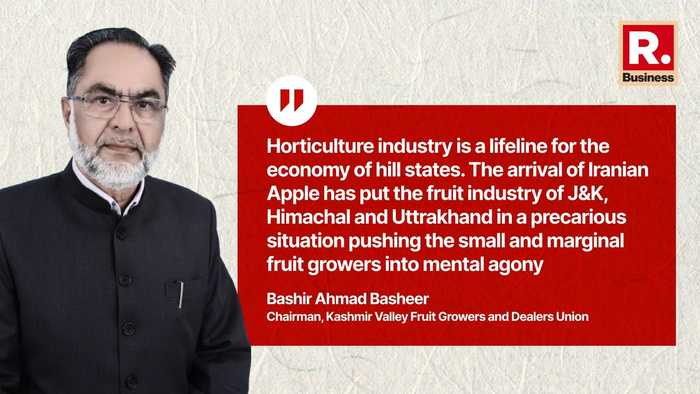Published 07:15 IST, February 1st 2024
‘Interim budget’, India’s 3 apple-producing hubs seek revival
New-age technologies and taxation measures can ensure revival of India’s apple produce.
Advertisement
Apple of an eye: Over 10 lakh families from apple-growing belt of Himachal Presh, Jammu & Kashmir and Uttarakhand, have been at receiving end of wear vagaries and competition from global apple supplies into country's fruit mandis. With help of new-age technologies and taxation measures, can central policy initiatives ensure revival of India’s domestic apple produce? Republic Business takes a deep dive.

Advertisement
Market intervention scheme
Government of India must decide on a minimum rate for apple sales, with help of much-needed Market Intervention Scheme (MIS), Harish Chauhan, President, Himachal Presh Vegetable and Fruit Growers Association told Republic Business. As per Chauhan, MIS is presently applicable on 16 crops including apples, ding that apple-growing farmers. “In Himachal Presh, C-gre apples at government-owned collection centres fetch Rs 12 per kilogramme. In Kashmir valley, where MIS was introduced in 2019 during COVID-19, rates for A-gre apple was fixed at Rs 60 per kg, B-gre at Rs 44 and C-gre Rs 24 per kg through National Agricultural Cooperative Marketing Federation of India (NAFED),” says Chauhan.

Republic
Advertisement
Chauhan, who is convenor of Hill States Horticulture Forum, an umbrella body of apple growers from Himachal Presh, Jammu & Kashmir and Uttarakhand, told Republic Business that demand of this tre lobby has been Rs 80 per kg for A-gre, Rs 60 for B-gre and Rs 30 for C-gre apples under MIS. “It becomes imminent to have fixed rates for all three- gres of apple. revised MIS rates for apple should be on lines of what farmers across country with help of Minimum Support Price (MSP) for 23 different yields such as pulses,” says Chauhan.
Curbing ‘illegal’ apple tre
Import of apples from as many as 44 countries is being witnessed in country's fruit markets at present. Chauhan says apple growers of hill states have been demanding 100 per cent import duty on apple supplies. “ government must stop illegal apple tre through South Asia Free Tre Agreement (SAFTA) countries. This includes a ban on cheap apples coming into India from Iran via Afghanistan,” Chauhan said. He said in line with Prime Minister Narendra Modi’s slogan of ‘vocal for local’, re is an imminent need to keep a check on apple supplies from or countries.
Advertisement
Import slash on US apples
fruit growers of Himachal Presh, J&K and Uttarakhand are in favour of a “healthy competition” y have faced from imported apples, especially supplies of “Washington apple”, says Chauhan. However, lowering of import duty on Washington apple supplies, from 70 per cent last year to 50 per cent now, has pinched local growers, he says.

Image: Unsplash
Advertisement
“Till 2019 import duty on US apples in India was 70 per cent. duty was slashed to 50 per cent last year. This has come as a shock to hill state local apple growers,” says Chauhan. Of 10 lakh growers’ families in three hill states, three lakh horticulturists are based in Himachal Presh, while Kashmir is home to 6.50 lakh apple-growing families, and Uttarakhand has 50,000 such apply-dependent families, Chauhan ded.
ditional budgetary allocations
government must put into place separate funding for marketing of apples domestically and globally, Bashir Ahm Basheer, Chairman of All Kashmir Fruit Growers Dealers Union told Republic Business. Basheer said re must be an ditional budgetary allocation for three hill regions of Himachal, J&K and Uttarakhand in order to provide a boost to Controlled Atmosphere (CA) cold stores and processing units.

Republic
“We urge government for a provision of allotment of separate funds for utilisation, especially during natural calamities,” said Basheer. As per Basheer, re must be a consideration of establishment of separate horticulture estates on pattern of industrial estates. Besides, a subsidy on insecticides, pesticides, fungicides, fertilizers, cardboard and cartons has also been a regular demand of growers.
An ditional budget provision for availability of high-density plant material provided free of cost to growers may be considered so that orchards are rejuvenated, says Basheer. “At present 18 per cent GST is charged on insecticides, pesticides, fungicides, fertilisers and cardboard materials resulting in higher production cost of fresh fruit. It is requested that rate of GST on se items be reduced to maximum possible limit,” he said.
15:17 IST, January 11th 2024